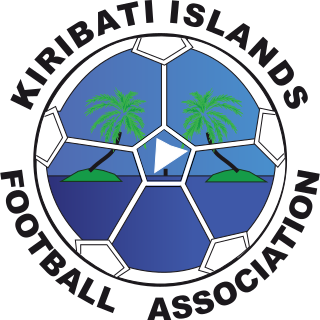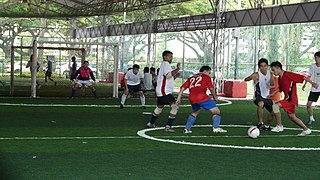
Association football, more commonly known as football or soccer, is a team sport played between two teams of 11 players each, who almost exclusively use their feet to propel a ball around a rectangular field called a pitch. The objective of the game is to score more goals than the opposing team by moving the ball beyond the goal line into a rectangular-framed goal defended by the opposing team. Traditionally, the game has been played over two 45-minute halves, for a total match time of 90 minutes. With an estimated 250 million players active in over 200 countries and territories, it is the world's most popular sport.

Futsal is a football-based sport played on a hardcourt like a basketball court, smaller than a football pitch, and mainly indoors. It has similarities to five-a-side football and indoor football.

The Fiji men's national football team is Fiji's national men's team and is controlled by the governing body of football in Fiji, the Fiji Football Association. The team plays most of their home games at the HFC Bank Stadium in Suva.

The Tahiti men's national football team represents French Polynesia and is controlled by the Fédération Tahitienne de Football. The team consists of a selection of players from French Polynesia, not just Tahiti, and has competed in the Oceania Football Confederation (OFC) since 1990.

The Kiribati men's national football team is the national men's football team of Kiribati and is controlled by the Kiribati Islands Football Association. Kiribati is not a member of FIFA but is an associate member of the Oceania Football Confederation (OFC), and is therefore not eligible to enter the FIFA World Cup but may enter the OFC Nations Cup. It became a provisional member of the N.F.-Board on 10 December 2005.

Five-a-side football is a version of minifootball, in which each team fields five players. Other differences from association football include a smaller pitch, smaller goals, and a reduced game duration. Matches are played indoors, or outdoors on artificial grass pitches that may be enclosed within a barrier or "cage" to prevent the ball from leaving the playing area and keep the game constantly flowing.

The Fiji Football Association is the governing body of football in Fiji. It came into existence in 1961. It is the overseeing body of the Fiji National Team and its leagues.

The Tuvalu national football team is the international football team of Tuvalu. Football in Tuvalu is played at the club and international level. The Tuvalu national team draws players from the Tuvalu A-Division and trains at the Tuvalu Sports Ground at Funafuti. The national team competes in the Pacific Games, and is controlled by the Tuvalu Islands Football Association, which is an associate member of the Oceania Football Confederation (OFC) but not a member of FIFA.

The Papua New Guinea women's national soccer team is controlled by the Papua New Guinea Football Association (PNGFA). Its nickname is the Lakatois, which is a Motuan sailing vessel. Their home ground is the Sir Hubert Murray Stadium, located in Port Moresby and their current manager is Peter Gunemba. Deslyn Siniu is the team's most capped player and top scorer.
Moise Poida is a Vanuatuan football manager and former player. He manages the Vanuatu men's national team and has been a former manager of club side Tafea. Poida has also managed the Vanuatu men's under-20 national team and Vanuatu men's under-23 national team. As a player, Poida made 21 appearances for the national team and scored three goals as a winger and midfielder. At club level, he played for Tafea F.C. for his entire career. In 2008 Poida played for an Oceanian representative side against a team that included members of France's 1998 FIFA World Cup winning team. The game included players such as Zinedine Zidane, Christian Karembeu and Robert Pires.

Roy Christopher Krishna is a Fijian professional footballer who plays as a striker for Indian Super League club Odisha and captains the Fiji national team. He is the most-capped and highest-scoring Fijian footballer of all time. In 2022, he became the first player to reach 50 caps for the Fiji national team.
The Solomon Islands national futsal team, nicknamed Kurukuru, represents the Solomon Islands in international futsal competitions and is controlled by the Solomon Islands Football Federation. It is one of the strongest teams in Oceania, but fares poorly in competitions outside the region.
Sport is an important part of Solomon Islands culture dating back to the early colonial period. Cricket, Australian rules football, rugby union and horse racing are among the earliest organised sports in Solomon Islands. Sport has shaped the Solomon Islands national identity through events. Solomon Islands hosted the 2023 Pacific Games in Honiara.

Association football is the most popular sport in Tuvalu. Football in Tuvalu is governed by the Tuvalu National Football Association (TNFA). The TNFA became an associate member association of the Oceania Football Confederation (OFC) on 15 November 2006 with a further reinstatement on 16 March 2020. The TNFA has been wanting to become a full member of the OFC and a member of FIFA since 1987.

The Tuvalu Islands Football Association (TIFA) is the governing body of football in Tuvalu. The association is responsible for the Tuvalu national football team and the Tuvalu national futsal team. Tuvalu is not a full member and is not affiliated with FIFA. It does not compete in FIFA World Cup Qualifiers because of its non-affiliation.
The Federated States of Micronesia national under-23 football team, nicknamed the Four Stars, is the national U-23 football team representing the Federated States of Micronesia and is controlled by the Federated States of Micronesia Football Association. The team is managed by Australian coach Stan Foster, with the assistant manager Curtis Graham.
Bong Kalo is a Ni-Vanuatu footballer who plays as a midfielder for Port Vila Premier League club, ABM Galaxy, and the Vanuatu national football team.
The 2018 OFC U-19 Championship was the 22nd edition of the OFC U-19/U-20 Championship, the biennial international youth football championship organised by the Oceania Football Confederation (OFC) for the men's under-19/under-20 national teams of Oceania. The qualifying stage was held in the Cook Islands between 26 May – 1 June 2018, and the final tournament was held in Tahiti between 5–18 August 2018.
The 2018 OFC Women's Nations Cup qualification tournament was a football competition that took place from 24 to 30 August 2018 in Lautoka, Fiji to determine the final women's national team which joined the seven automatically qualified teams in the 2018 OFC Women's Nations Cup final tournament in New Caledonia.
On 9 April 2001, Tonga and Australia played an international soccer match at the International Sports Stadium in Coffs Harbour in the Australian state of New South Wales. The match was an Oceania Football Confederation (OFC) first round qualifying match for the 2002 FIFA World Cup. Tonga, nominally the home team for this round robin qualifying match, were defeated 0–22 by Australia. This beat the previous international record of 20–0 from October 2000 when Kuwait defeated Bhutan on 12 February 2000 in qualification for the 2000 AFC Asian Cup. The margin of defeat also beat the previous record in a FIFA World Cup qualifying match, the 19–0 result between Iran and Guam in Tabriz in November 2000. The margin was surpassed two days later when Australia again prevailed, defeating a depleted American Samoa team with a 31–0 scoreline.








